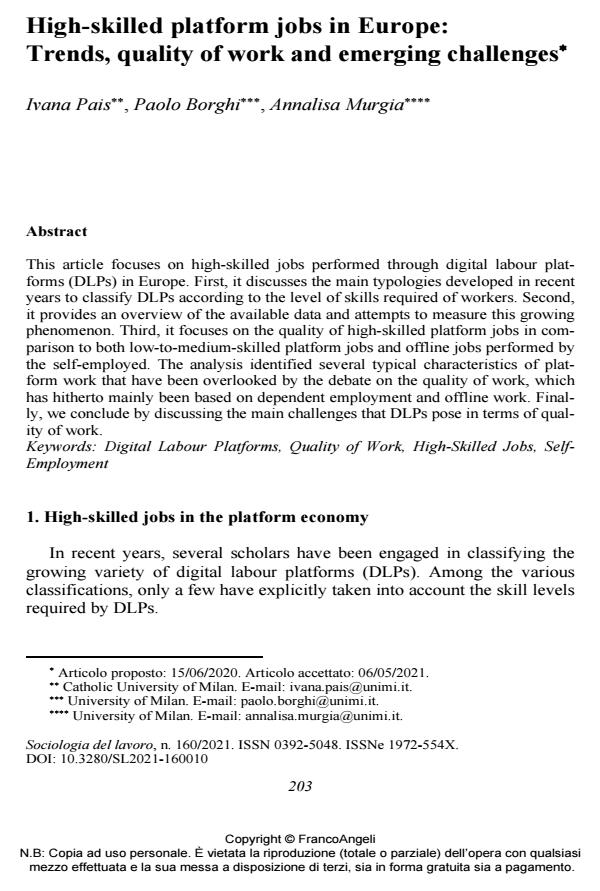High-skilled platform jobs in Europe: Trends, quality of work and emerging challenges
Titolo Rivista SOCIOLOGIA DEL LAVORO
Autori/Curatori Ivana Pais, Paolo Borghi, Annalisa Murgia
Anno di pubblicazione 2021 Fascicolo 2021/160
Lingua Inglese Numero pagine 21 P. 203-223 Dimensione file 237 KB
DOI 10.3280/SL2021-160010
Il DOI è il codice a barre della proprietà intellettuale: per saperne di più
clicca qui
Qui sotto puoi vedere in anteprima la prima pagina di questo articolo.
Se questo articolo ti interessa, lo puoi acquistare (e scaricare in formato pdf) seguendo le facili indicazioni per acquistare il download credit. Acquista Download Credits per scaricare questo Articolo in formato PDF

FrancoAngeli è membro della Publishers International Linking Association, Inc (PILA), associazione indipendente e non profit per facilitare (attraverso i servizi tecnologici implementati da CrossRef.org) l’accesso degli studiosi ai contenuti digitali nelle pubblicazioni professionali e scientifiche.
This article focuses on high-skilled jobs performed through digital labour platforms (DLPs) in Europe. First, it discusses the main typologies developed in recent years to classify DLPs according to the level of skills required of workers. Second, it pro-vides an overview of the available data and attempts to measure this growing phenomenon. Third, it focuses on the quality of high-skilled platform jobs in com-parison to both low-to-medium-skilled platform jobs and offline jobs performed by the self-employed. The analysis identified several typical characteristics of platform work that have been overlooked by the debate on the quality of work, which has hitherto mainly been based on dependent employment and offline work. Finally, we conclude by discussing the main challenges that DLPs pose in terms of quality of work.
Questo articolo analizza i lavori qualificati eseguiti attraverso piattaforme di lavoro digitali in Europa. Innanzitutto, discute le principali tipologie sviluppate negli ultimi anni per classificare le piattaforme di lavoro digitale in base al livello di competenze richieste a lavoratori e lavoratrici. In secondo luogo, fornisce una panoramica dei dati disponibili e dei tentativi di misurazione di questo fenomeno in crescita. In terzo luogo, si concentra sulle specificità dei lavori di piattaforma qualificati rispetto ai lavori di piattaforma che richiedono competenze medio-basse e ai lavori offline svolti dai/lle lavoratori/trici autonomi/e. Ciò ha permesso di identificare una serie di caratteristiche tipiche del lavoro su piattaforma che sono state trascurate dal dibattito sulla qualità del lavoro, finora basato principalmente sul lavoro dipendente e offline. Infine, concludiamo discutendo le principali sfide che le piattaforme di lavoro digitale pongono in termini di qualità del lavoro.
Parole chiave:piattaforme di lavoro digitale, qualità del lavoro, lavoro qualificato, lavoro autonomo
- Mapping the Evolution of Platform Society Cecilia Biancalana, Valentina Goglio, pp.1 (ISBN:978-1-83608-029-9)
- СОЦІАЛЬНО-ТРУДОВИЙ ВИМІР ЕКОНОМІКИ ПЛАТФОРМ Анатолій Колот, Іван Рябоконь, Юлія Бабій, in Економіка та суспільство /2024
DOI: 10.32782/2524-0072/2024-68-110 - Employment quality in the new socio-economic reality: theoretical and methodological foundations Anatolii Kolot, Ivan Ryabokon, Julia Babii, in Social and labour relations: theory and practice /2024 pp.12
DOI: 10.21511/slrtp.14(1).2024.02 - El trabajo que cambia: nuevos trabajos y nuevas identidades laborales Sofía Pérez de Guzmán Padrón, Ivana Pais, in Cuadernos de Relaciones Laborales /2024 pp.13
DOI: 10.5209/crla.94698 - Blucher Engineering Proceedings Hoyêdo Nunes Lins, pp.1434 (DOI:10.5151/vi-enei-865)
Ivana Pais, Paolo Borghi, Annalisa Murgia, High-skilled platform jobs in Europe: Trends, quality of work and emerging challenges in "SOCIOLOGIA DEL LAVORO " 160/2021, pp 203-223, DOI: 10.3280/SL2021-160010